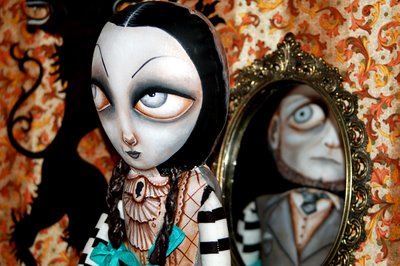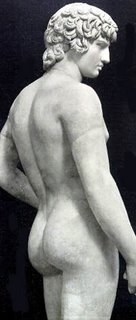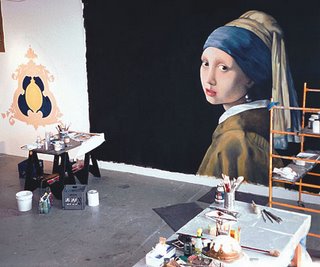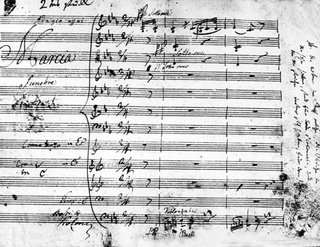
Fred Dodsworth: Why "Queer"?
Erling Wold: I loved this book when I read it 15 years ago. I just
identified with the character. I identified with the unrequited love in
it.
I was really taken with the language and the feeling of it, the emotion of
it.
Q: Tell me about the emotion.
A: It's an autobiographical novel. The character William Lee is
Burroughs, and he falls for this younger guy named Eugene Allerton who
is...
it's a little unclear what he is. He's either closeted or indifferent or a
hustler or something. He responds to Lee but he doesn't... kind of...
(Nervous chuckle.) He responds but not completely. Basically it's a
sad, unrequited love story. This is probably the best description of that
I've ever read, either in gay or straight or whatever literature. This is
actually one of my favorite kinds of stories.
Q: Why?
A: I like that emotion, that feeling where you're really drawn to
somebody and you just can't have them. (Nervous laughter.) I'm very
attracted to that kind of story and that kind of feeling. It's a very
romantic story.
In fact, Queer, the character, is a hopeless romantic. That's a big
part of the way it's done. Lee sings. Allerton only speaks. It's very
much Lee's story. The whole story is told from Lee's point of view. All
the characters are only there in as much as they are a reflection of what
Lee is feeling for that person at that moment. They're never presented in
any kind of three-dimensional way. He's kind of a boorish guy in some
ways.
He's kind of racist. He's an ugly American in Mexico City...
Q: Isn't this when Burroughs "accidentally" killed his wife?
A: He killed his wife and then became a writer. Allen Ginsberg
thinks she was committing suicide. They were playing William Tell with a
shot glass. Who knows? They were both drunk. He was an excellent shot.
It's unclear what was going on. Burroughs and his wife had a very
interesting relationship. They were very close. They were like soulmates,
but he was a pretty gay guy. This is a time when people didn't tend to
identify themselves as being gay, but he does. He's very outspoken about
it. He's very open about it and, in fact, he's angry with the world
because
it interferes with all the things that are important to him -- being gay,
being a junkie. The world gets in the way of that.
Q: Gay? Married?
A: Early in his life he was a big ladies man. He also liked men
from early on. At this time he's living in Mexico City with his wife but
he's totally going after all the Mexican boys he sees, plus this Allerton
guy, and he has this little circle of queer friends that hang around in
this
ex-patriot [sic: expatriate] bar community. I don't know what that all
means. Later in life he became a misogynist. He decided that women were
evil.
Q: Do you assume any responsibility when you promote this work?
A: I don't know if I take responsibility for every single thing but
I do like certain things about his worldview. They do connect with me. I
understand this idea that the world is in your way... that there're a lot
of
people who disapprove of what you're doing. That's VERY annoying.
Q: What is the responsibility of an artist?
A: I've come to believe you do it as a philanthropic gesture to the
world. You're not in it for yourself -- not doing the kind of thing that I
do -- that's not commercial. The only kind of reason I can see that makes
sense is that you're driven to do it, but also, hopefully, you're giving
people some cultural experiences that will be important to them. I think
there's a certain amount of social responsibility, but I think that just
comes from yourself. You just do things that are true to what you believe,
and that's as much as you do.
Q: Are you trying to teach social lessons?
A: I'm not -- except in the fact that the things I pick are what I
believe in. "I believe in this, but you can take it or leave it."
(Laughter.) I don't know that I'm trying to convince people. I know that
if you "touch" people, you tend to convince them of something that you
believe. I like that.
I think there's a place for social art. Some people who do it
transcend it. You have to have something to get you started. For some
people that's a social concept and for some people it's a theoretical
concept.
Q: Is this show audience-specific?
A: No, it's not.
Q: Even with a title like "Queer"?
A: It's an interesting title. In a way his use of the word "queer"
is more like "odd." He's an odd person. He's outside of whatever. More
than being queer like it is now, which is a political word. This is all
before that. It's weird. Oddball guy. It obviously means gay or fag or
whatever but... I think there's a universal aspect to the story. It's a
love story. It's also a crazy Burroughs' story. He goes on these large
flights of fantasy. Those are enjoyable.
But this piece is the first time I've ever had someone send me a
nasty note back from an e-mail announcement, saying, "Take me off your
mailing list," and sending a Bible verse along with it. I've done things
that were loaded in the past, that were questionable, but this is still a
topic that people get upset about.
Q: Do you think our local community still is homophobic?
A: Obviously. I think it's very strong. We're lucky we live in a
part of the world that's much more reasonable about these things. Outside
of this geographical area it's... very intense. Everybody knows this.
Q: I don't think everybody knows this. Let's go back to unrequited
love, is that the natural state of love?
A: Noooooo. This is not every aspect of my life, this is one
aspect. I think what attracted me is the strength of that emotion.
Emotions like jealousy, unrequited love, desire, longing, in some ways
those
are even stronger than when you settle in. I think those emotions are
stronger. I think I feel them more strongly. Since I come from a very
emotional place when I write music, I think the stronger emotions even
drive
me more.
Q: Are you trying to shock?
A: There's a certain appeal to shocking people, to saying there's
this aspect of life outside of what you normally think about. There are
aspects of living that are not discussed a great deal. I do like pieces
that touch on those things. Sometimes it's fun to shock people, just to
shock people. That doesn't interest me so much, although sometimes it's
fun. I like those certain aspects of life that are on the edge and I've
always had things that interest me a lot -- sexuality, dreams, religion.
It probably has something to do with the way I was raised. I was
raised in a Lutheran family. My father was a minister and my mother worked
in the church. Sometimes when you say to people you were raised in a
Christian family that seems like some horrible thing. It was actually very
pleasant. My parents were very considerate. In some ways they were more
liberal than I was when I was growing up. I remember coming home from
college and finding out they were active in some gay-lesbian community
inside the Lutheran Church.
Q: Did you come out then?
A: Actually... well... here's an interesting thing. I am not gay.
I'm not necessarily not a gay person but... I don't necessarily know how
much of this I want published.
Q: You're the one that's producing an opera titled "Queer"
A: Well... I...
Q: ... and you're not even gay.
A: That's an interesting thing, isn't it?
Labels: music, opera, queer
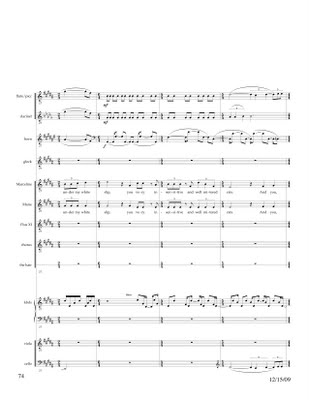 Clark Suprynowicz and I were talking opera libretti recently at a fundraiser for the John Duykers and Miguel Frasconi work-in-progress, Hand to Mouth: The Journey of the Seed from Soil to Plate, a opera-ette which draws on John's other career as organic farmer and nearly-organic beekeeper, and the fact of our divergent approaches made got me to thinking. I'm a prose man, and believe in the sanctity of the language, which is typically my entrée into a text-based piece. To reiterate, language is the key to an opera composition, the way in, containing something that strikes me as being musical, in whatever sense one takes that. I've been considering Queer again lately, as we are planning to remount that in the Spring of 2011 as the 10th anniversary of the premiere and the 25th anniversary of the book's publication. Burroughs's writing is very musical, its flow and lilt and repetitions and its connection straight to the gut, not poetic in the old-fashioned sense of meter and foot, but its music inspired my own. In comparison, Clark's cavalier attitude to what his librettists have written down, and the fact that he bends their words to fit his tunes, seem quite sinful. For me, tunes and music spring from the words, although I hope that the music isn't simply painting colors over the words and that the music that comes from this interaction can stand on its own. I remember being asked once by a singer during the development of an early piece which sections were recit and aria and I realized it hadn't even crossed my mind. I was presenting the text, and I suppose some sections fit one label or the other, that some were internal monologue, outside of the action, and some were more action oriented, but I didn't stop somewhere along the way to sing a song, a song with a melody upon which the words were hung.
Clark Suprynowicz and I were talking opera libretti recently at a fundraiser for the John Duykers and Miguel Frasconi work-in-progress, Hand to Mouth: The Journey of the Seed from Soil to Plate, a opera-ette which draws on John's other career as organic farmer and nearly-organic beekeeper, and the fact of our divergent approaches made got me to thinking. I'm a prose man, and believe in the sanctity of the language, which is typically my entrée into a text-based piece. To reiterate, language is the key to an opera composition, the way in, containing something that strikes me as being musical, in whatever sense one takes that. I've been considering Queer again lately, as we are planning to remount that in the Spring of 2011 as the 10th anniversary of the premiere and the 25th anniversary of the book's publication. Burroughs's writing is very musical, its flow and lilt and repetitions and its connection straight to the gut, not poetic in the old-fashioned sense of meter and foot, but its music inspired my own. In comparison, Clark's cavalier attitude to what his librettists have written down, and the fact that he bends their words to fit his tunes, seem quite sinful. For me, tunes and music spring from the words, although I hope that the music isn't simply painting colors over the words and that the music that comes from this interaction can stand on its own. I remember being asked once by a singer during the development of an early piece which sections were recit and aria and I realized it hadn't even crossed my mind. I was presenting the text, and I suppose some sections fit one label or the other, that some were internal monologue, outside of the action, and some were more action oriented, but I didn't stop somewhere along the way to sing a song, a song with a melody upon which the words were hung.
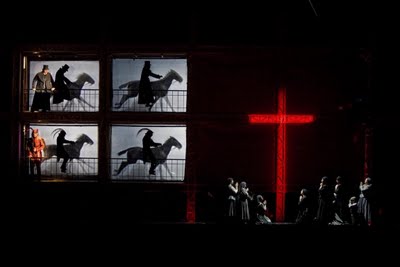

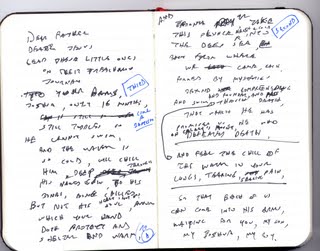
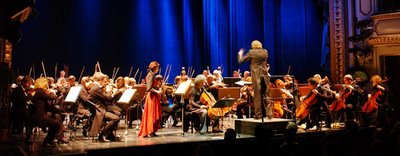

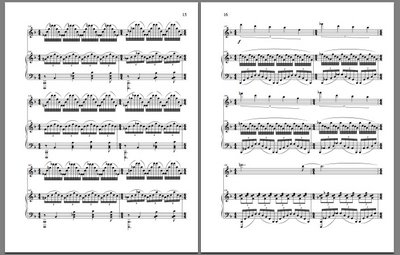


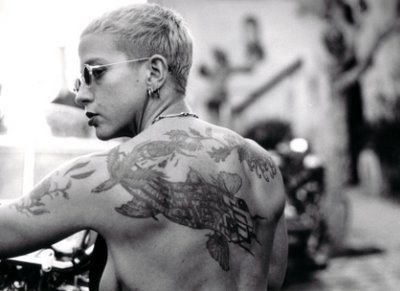


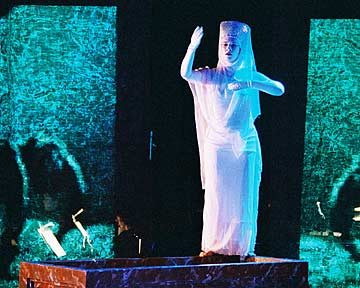
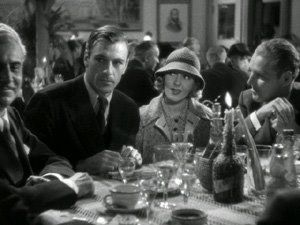

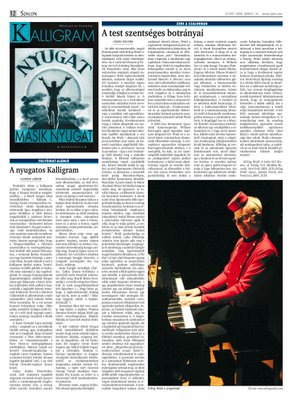
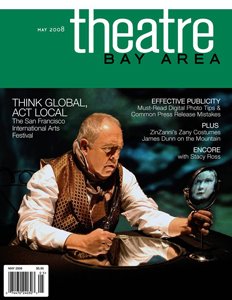
 I was informed by electronic post late last night that Lynne has been
I was informed by electronic post late last night that Lynne has been 